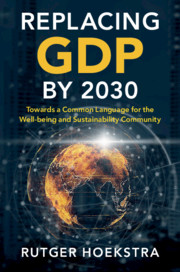Book contents
- Replacing GDP by 2030
- Advance Praise for Replacing GDP by 2030
- Replacing GDP by 2030
- Copyright page
- Dedication
- Contents
- Figures
- Tables
- Boxes
- Preface
- Acknowledgements
- Part I Why a New Strategy Is Needed
- 1 Replacing the Most Influential Indicator in the World
- 2 Why Is GDP Successful?
- 3 What Does GDP Measure (And What Not)?
- 4 Why Is Beyond-GDP Not Successful?
- Part II The New Strategy: A Community for Well-being and Sustainability
- Annex: Beyond-GDP Milestones and Measurement Systems
- Notes
- References
- Index
4 - Why Is Beyond-GDP Not Successful?
from Part I - Why a New Strategy Is Needed
Published online by Cambridge University Press: 24 May 2019
- Replacing GDP by 2030
- Advance Praise for Replacing GDP by 2030
- Replacing GDP by 2030
- Copyright page
- Dedication
- Contents
- Figures
- Tables
- Boxes
- Preface
- Acknowledgements
- Part I Why a New Strategy Is Needed
- 1 Replacing the Most Influential Indicator in the World
- 2 Why Is GDP Successful?
- 3 What Does GDP Measure (And What Not)?
- 4 Why Is Beyond-GDP Not Successful?
- Part II The New Strategy: A Community for Well-being and Sustainability
- Annex: Beyond-GDP Milestones and Measurement Systems
- Notes
- References
- Index
Summary
The history of Beyond-GDP is far more complex than the history of GDP because it is hard to define the boundaries of this field. Some fields have a long history: the measurement of Subjective Well-being (SWB) started just after the Second World War and Green Accounting emerged in the early 1970s. This chapter shows that there are basically four types of methodologies. Up to the early 1990s, the majority were green accounting or SWB indexes (conceptual indexes). After the publication of the Brundtland Report and subsequent Earth Summits, the other three types (composite indicators, and conceptual and non-conceptual indicator sets) also became popular. With the adoption of the SDGs in 2015, the situation became even more dynamic. The chapter shows that Beyond-GDP is a highly heterogeneous community without the powerful features of the GDP multinational. It is a community without a common language and is therefore incapable of communicating with each other or the rest of society. The only positive exception is the System of Environmental and Economic Accounts (SEEA), which provides the accounting framework and indicators for environmental macroeconomics.
Keywords
- Type
- Chapter
- Information
- Replacing GDP by 2030Towards a Common Language for the Well-being and Sustainability Community, pp. 79 - 102Publisher: Cambridge University PressPrint publication year: 2019

